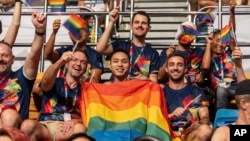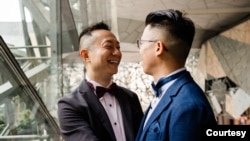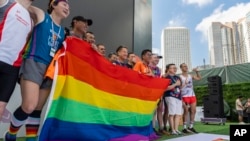Something remarkable happened in Hong Kong’s decadeslong LGBTQ rights movement in recent months, though it is unclear what it means for the future.
Hong Kong’s courts issued several rulings in favor of granting LGBTQ rights — including no longer requiring conversion surgery to change their gender on ID cards, allowing same-sex couples to apply for subsidized public housing together, and perhaps the most important by the city’s highest court — ordering the government to come up with a framework within two years to recognize same-sex partnerships.
Additionally, the government last month allowed the Gay Games, an international sports event for LGBTQ athletes, to be held in Hong Kong — a first for the city and Asia.
"In general, [LGBTQ rights] are progressing. ... It’s pointing in the right direction," said Jerome Yau, co-founder of Hong Kong Marriage Equality, a group dedicated to eliminating discrimination against same-sex couples. "The government is now legally obliged to come up with a framework to legally recognize same-sex marriage by October 2025. … So, something has to happen in two years. That’s a very significant decision."
While that ruling and other recent developments are seen as achievements, there are worries that government hesitation, possible intervention by Beijing, and Christian opposition – could prevent the city from becoming the next place in Asia, after Taiwan and Nepal, to grant equal rights to same-sex couples, including the right to get married.
"We’re in a rather complicated situation," Yau said. "We have to tread very carefully."
The government, considered conservative in advancing LGBTQ legislation even before Hong Kong’s handover to Chinese sovereignty in 1997, has given no indication of how it would carry out the top court’s ruling.
The Housing Authority, meanwhile, has appealed to overturn the housing rulings issued by lower courts.
At the same time, anti-gay religious opponents, including a lawmaker, have protested the games and the legalization of same-sex marriage, alleging they could threaten national security. The controversial national security law passed in 2020 has been used to jail people on charges of secession, subversion, terrorism and collusion with foreign forces.
Additionally, the annual Hong Kong Pride Parade, which used to attract thousands of participants to march on the city’s streets, was not held again this year, despite the end of COVID restrictions. Instead, an indoor exhibition was held.
"With all these developments, sometimes you see the government take one step forward and walk two steps backwards. We feel disappointed," said Paul Choi, an LGBTQ rights advocate.
Hong Kong’s courts and public opinion may be moving at a faster pace than the government seems willing to.
A survey conducted by three universities earlier this year found that 60% of Hong Kongers said they supported same-sex marriage, up from 50% in 2017 and 38% in 2013.
At the same time, the percentage of Hong Kong residents who said they were unaccepting of gay men and lesbians dropped significantly — from 32% in 2013, to 13% this year, according to the survey.
The study’s researchers attributed the change in attitude to favorable court rulings, more jurisdictions around the world legalizing same-sex marriage and increasing representation of lesbians and gay men in the media. This includes the recently held Hong Kong Lesbian & Gay Film Festival, the longest running of its kind in Asia.
Now, many are waiting to see if the government will keep pace. There are concerns it will drag its feet or allow only separate and partial rights.
Same-sex couples who got married abroad, including simply on Zoom calls with U.S. states that allow remote marriage registration, already qualify for dependent visas, civil-servant spousal benefits, and joint tax filing.
But LGBTQ community members said they want equal rights, arguing the city’s mini-constitution, the Basic Law, promises all Hong Kong residents "shall be equal before the law." They said creating a separate status for them will not grant them the same rights heterosexual couples enjoy.
"Think about it, as a citizen, I’m born and grew up here and want to get married. Why do I have to travel somewhere else to get married?" asked Choi, who recently married his partner in Melbourne, Australia.
They have had to create a will and prepare power of attorney documents, although they still don’t know if they can visit each other in a hospital as family members or make medical decisions for each other if needed.
There are also fears that a tightening of restrictions on LGBTQ groups in mainland China in recent years could spread to Hong Kong, especially given lingering government worries about a return of the widespread and sometimes violent pro-democracy protests seen here in 2019.
"There's no one threatening us, but the biggest problem we’re facing right now is that when we want to hold events [like the pride parade], we have people telling us maybe it’s not a great idea," said Alan Hau, deacon of the LGBTQ-inclusive Blessed Ministry Community Church.
Yau sounded hopeful, though, pointing out that another gay pride event, Pink Dot, has received permission to be held in a popular gathering spot.
"We still have space to do things, which unfortunately is a whole different situation across the border. We should treasure this space," Yau said. "Things are happening. … It’s just that things are not moving at a faster pace. Let’s see how things will go in the next two years."






